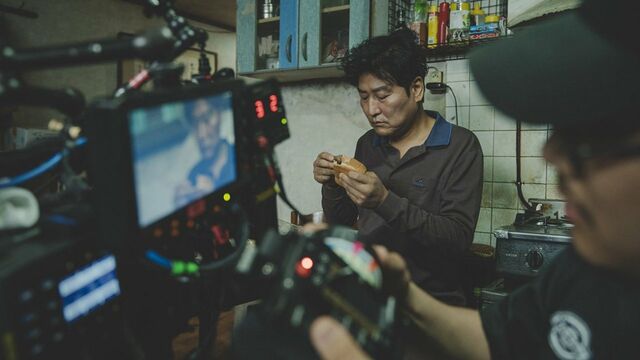Bonjour! The Best in Show crew digs into the Best International Feature race, with an entrée of an interview between Brian, Juliette Binoche and Trần Anh Hùng about their César-nominated collaboration, The Taste of Things. Gemma, Mia and Brian also divulge the recipe for the International Feature category and how its submissions work—and briefly bring in Perfect Days director Wim Wenders as a treat.
Brief takes with… Bong Joon-ho

The Parasite director on Psycho, facial mud-masks and not scratching the furniture.
“Even the trash can was expensive.” —Bong Joon-ho
It was never too early to call Bong Joon-ho’s as many have recommended, best seen with as little prior information as possible.
Unless, of course, you’re a mega-stan of director Bong, in which case it will suit you to know certain things: frequent collaborators are back, most notably cinephilic inspirations; and the production design, which is meticulous to the point where it was a budgetary issue, as we discovered when we put a few questions to Bong Joon-ho this week.

You’ve already talked a lot about the production design of Parasite, but since these spaces are essential to the psychology of the story, please tell us more about the two houses: the Kim family’s cramped basement apartment, the Park family’s minimalist mansion (designed by fictional architect “the great Namgoong”).
Bong Joon-ho / 봉준호: Most of the narrative happens in two spaces, and all the houses you see in the film—the rich house, poor house, neighborhood surrounding the poor house—were built from scratch. For the rich house, I already had a basic sketch of the structure as I wrote the script. I had specific requirements in of what the characters would or would not be able to see from certain positions, where they could eavesdrop, how they would move from one position to the next, and the like. I handed that rough sketch to the production designer [Lee Ha-jun], and he worked with actual architects to ensure that the house looks beautiful and believable, while meeting all my demands.
Also, the DP [Hong Kyung-pyo] and I wanted to use natural sunlight as much as possible, so we observed the sun’s position throughout the day to determine the direction and design of the house. In of interior design, the production designer filled the space with very expensive furniture, props, and décor; even the trash can was expensive. I the production designer and line producer being very anxious on set and pleading with us to be careful not to scratch anything as most of them were rented.

For the poor neighborhood, the art and set department actually visited neighborhoods scheduled to be redeveloped, and went inside abandoned homes to take the doors, window sash, tiles, and other materials to build the set with. They ended up adding a realistic texture to the neighborhood; even Korean audiences didn’t realize it was all built. And due to the flood sequence, we had to build it in a water tank. We filled it up with water on the last two days of shooting there. We added in facial mud masks to give the water that sewage color. Great skincare for my actors.
What film is the definition of a South Korean masterpiece?
The 1960 film The Housemaid by Kim Ki Young is a true Korean masterpiece. The film was restored by Martin Scorsese’s The Film Foundation and screened at Cannes Classics. It’s also available in the Criterion Collection.
You’ve talked before about how 1970s American cinema inspired you to become a filmmaker. Can you name some specific films that particularly made you go “this is what I have to do”?
I watched many films by John Carpenter, Brian de Palma, Sam Peckinpah, but ultimately, all these filmmakers are part of the Hitchcock lineage. Hitchcock still remains as one of my biggest inspirations.

Did you catch The Irishman yet?
I’m dying to see The Irishman. I really cannot wait.
What’s your go-to comfort movie? The one that you’ll always put on, no matter what, and how many times do you think you’ve seen it?
I’ve watched Zodiac.
Finally, we’d like you to name some newer-generation directors that the Letterboxd community should have our eyes on.
Ari Aster (The Nightingale).
‘Parasite’ is in select US cinemas now. With thanks to NEON.




